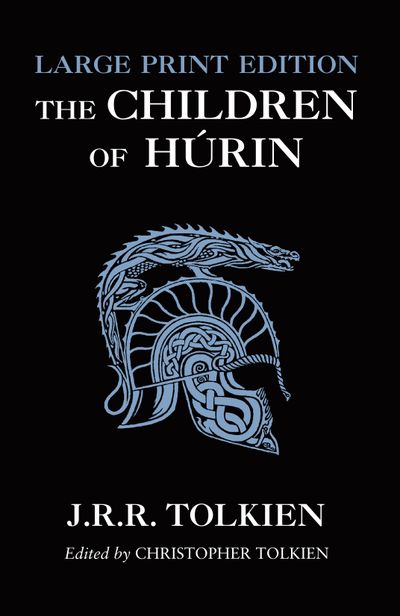The Children of Húrin: Large type edition
The large print edition of the epic tale of The Children of Húrin reunites fans of The Hobbit and The Lord of the Rings with Elves, dragons, Dwarves and Orcs, and the rich landscape and characters unique to Tolkien.
There are tales of Middle-earth from times long before The Lord of the Rings, and the story told in this book is set in the great country that lay beyond the Grey Havens in the West: lands where Treebeard once walked, but which were drowned in the great cataclysm that ended the First Age of the World.
In that remote time Morgoth, the first Dark Lord, dwelt in the vast fortress of Angband, the Hells of Iron, in the North; and the tragedy of Túrin and his sister Nienor unfolded within the shadow of the fear of Angband and the war waged by Morgoth against the lands and secret cities of the Elves.
Their brief and passionate lives were dominated by the elemental hatred that Morgoth bore them as the children of Húrin, the man who had dared to defy and to scorn him to his face. Against them he sent his most formidable servant, Glaurung, a powerful spirit in the form of a huge wingless dragon of fire. Into this story of brutal conquest and flight, of forest hiding-places and pursuit, of resistance with lessening hope, the Dark Lord and the Dragon enter in direly articulate form. Sardonic and mocking, Glaurung manipulated the fates of Túrin and Nienor by lies of diabolic cunning and guile, and the curse of Morgoth was fulfilled.
The earliest versions of this story by J.R.R. Tolkien go back to the end of the First World War and the years that followed; but long afterwards, when The Lord of the Rings was finished, he wrote it anew and greatly enlarged it in complexities of motive and character: it became the dominant story in his later work on Middle-earth. But he could not bring it to a final and finished form. In this book Christopher Tolkien has constructed, after long study of the manuscripts, a coherent narrative without any editorial invention.
'It has seemed to me for a long time that there was a good case for presenting my father's long version of the legend of the Children of Húrin as an independent work, between its own covers, with a minimum of editorial presence, and above all in continuous narrative without gaps or interruptions, if this could be done without distortion or invention, despite the unfinished state in which he left some parts of it.' Christopher Tolkien -
“The Children of Hurin is about to thrill and intrigue millions. It is safe to say that the 'great tale' of Turin is about to become a global myth…in its own dotty but also awe-inspiring way, it works.” Sunday Times Culture -
“…worthy of a readership beyond Tolkien devotees…this book deserves to eclipse all his other posthumous writings, and stand as a worthy memorial to the imagination of Tolkien.' The Times -
“I hope that its universality and power will grant it a place in English mythology'… It isn't jolly, but then neither is Anthony and Cleopatra.” The Independent on Sunday -
